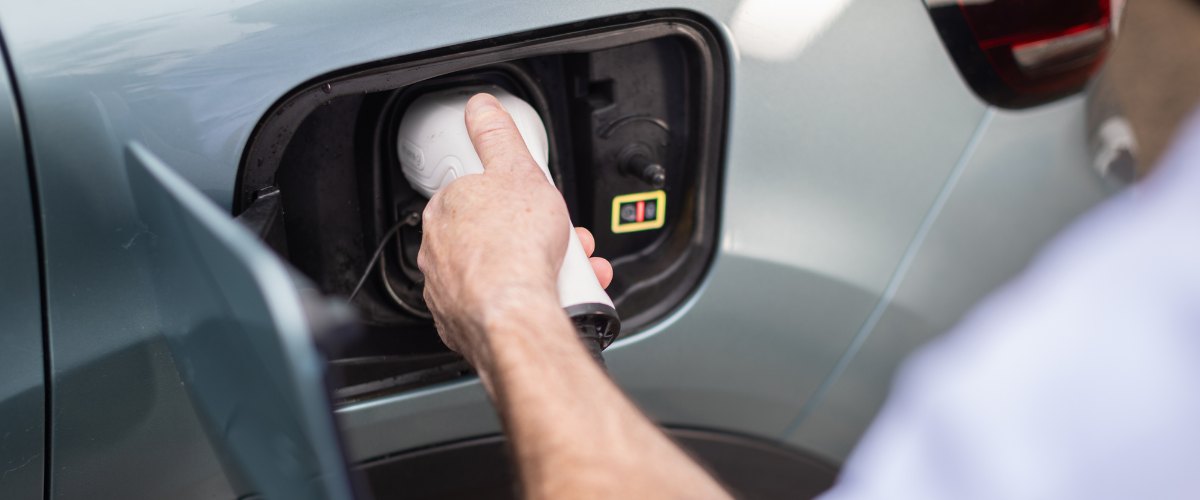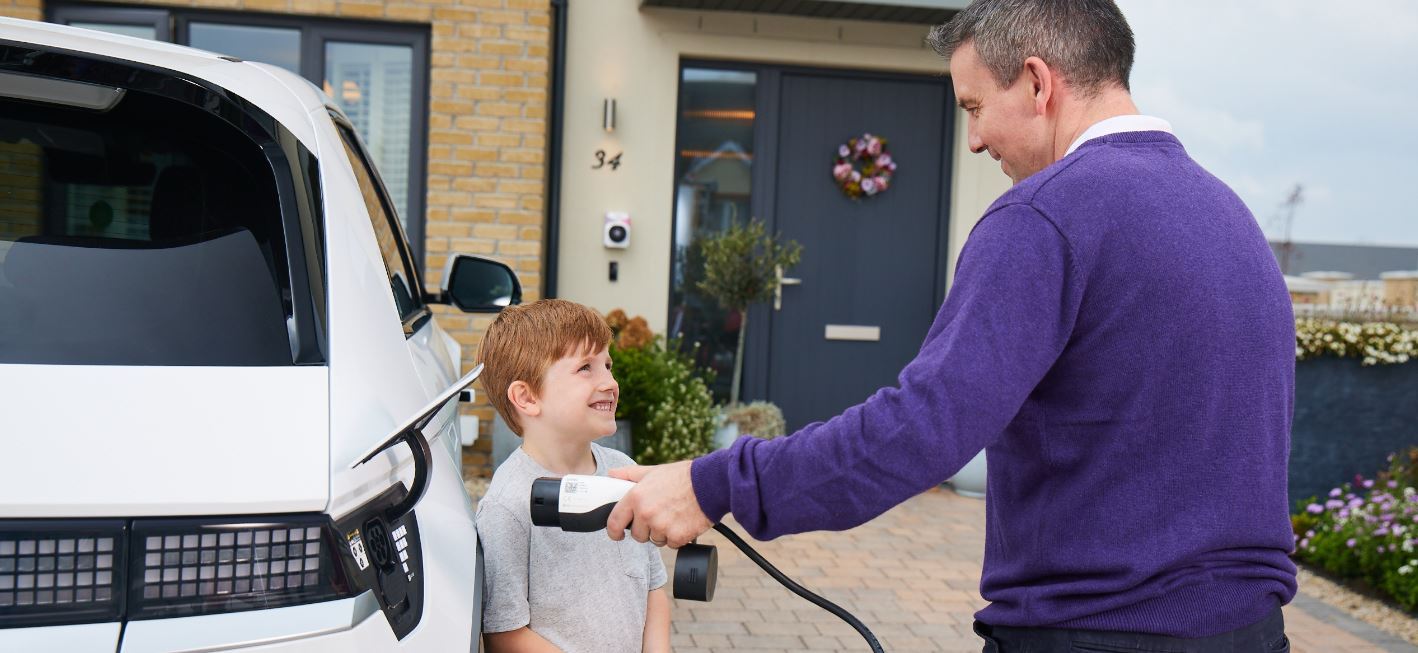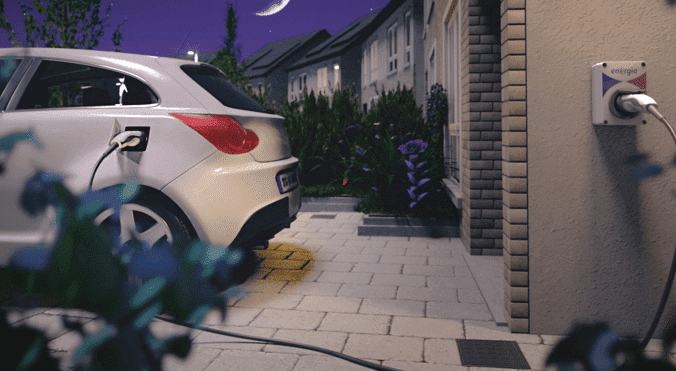EV Chargers in Ireland
*Subject to verification by the CRU under the CRU’s Green Source Product Verification process.
The adoption of electric vehicle in Ireland has seen an uptick in recent years, with a total of number of registered EVs reaching over 125,000 at the end of April 2024.
The Irish government has set an ambitious target of having around 950,000 EV on the road by 2030 as part of Climate Action Plan, which essentially means that approximately one third of all vehicles sold during the decade will be Battery Electric Vehicle (BEV) or Plug-in Hybrid Electric Vehicle (PHEV).
To facilitate this, Ireland offers a range of electric car charger grants if you buy a BEV that meets specific standards. You can avail a grant of up to €3,500 from the Sustainable Energy Authority Ireland for battery-powered electric vehicles. You can also receive a grant of up to €300 as part of Electric Vehicle Home Charger Grant scheme that will aid you install an EV charging point on your property.
Why Ireland is ideal for EV adoption
- We are a relatively small island, so most journeys are within the range of electric car batteries.
- There is significant government support for buying an electric car in the form of grants and tax breaks.
- Our mild climate enables electric car batteries to perform efficiently.
- High rates of home ownership mean many can install home charging points.
How many public EV charging stations are there in Ireland?
Ireland has a growing network of publicly accessible EV charging stations. There are over 2,500 public EV charging points across the island of Ireland, consisting of both AC (standard 22kW) chargers and DC (25 to 350+kW) chargers. This includes charging points that the ESB operates and maintains, which is around 1,600 across the island.
Plans are afoot to significantly increase and accelerate the delivery of EV charging points in the coming years. In 2024, Ireland announced a new €21 million grant scheme targeting the motorway/dual-carriageway network, which will drive the installation of high-power recharging pools with 1200kW power output every 60 kilometres. These new sites will make EV chargers in Ireland more accessible than ever before.
What types of public EV chargers are available in Ireland?
EV chargers are generally classified into three main types based on their charging speed and power output.
Standard AC Chargers (Up to 22kW):
Found typically on-street or in public car parks, these chargers can charge your car in approximately between 1 to 6 hours.
Fast DC chargers (22-100kW):
Usually found in motorway service stations and selected car parks, these chargers can charge your car up to 80% in as little as 30 minutes.
High-power chargers (Over 150kW):
These are designed for ultra-fast top-ups, often located along motorways and national road sites. These can provide your car up to 100km of driving range in as little as 6 minutes.
If you've just bought your brand new EV, be sure to read our comprehensive guide for new electric vehicle owners that covers everything you need to know about selecting the right charging solutions.
How to find electric vehicle charging stations in Ireland?
You can either use the onboard car navigation or an app to find nearest EV chargers in Ireland. Most EV charger networks have apps for locating chargers, providing live updates on charger availability and monitoring charging sessions. Plan your route and easily locate EV charging stations across the country using our EV charger map – Zapmap for real-time updates.
How much do public electric vehicle charging stations cost?
Public EV charging costs in Ireland depend on the type of charger and whether you’re using a membership plan.
For standard AC chargers (up to 22 kW), the cost is typically around €0.52 per kWh on a pay-as-you-go basis, while members pay a reduced rate of about €0.47 per kWh. Fast DC chargers (up to 50 kW) cost approximately €0.57 per kWh for non-members and €0.52 for members. High-power chargers (150 kW and above), which are ideal for quick top-ups, are the most expensive, averaging around €0.59 per kWh for pay-as-you-go users and €0.54 for members.
Membership plans, which usually cost around €4.79 per month, offer discounted rates and can be cost-effective for frequent users. Additionally, some charging stations may apply idle fees if a vehicle remains plugged in after charging is complete.
Whichever option you choose it’ll cost much less than a tank of petrol or diesel right now.
How to get an electric car charger for home?
You can avoid relying on public charging stations most of the time by installing an EV charge point at home. Thanks to support from Energia and SEAI, setting up a home charger is straightforward. Check out our comprehensive guide on EV charger installation to understand the process and make your transition to electric driving hassle-free.
If you're considering purchasing a new electric vehicle, explore our exclusive dealer partnership offers. You can also learn more about our specially designed EV electricity plan, which offers reduced night-time rates.
Advantages of having an electric car charger at home
- Convenience: Charge your EV overnight from the comfort of your home, ensuring it's ready to go each morning.
- Smart Technology: Dedicated home chargers are intelligent - they manage energy flow efficiently to your battery.
- Reduced Rates: With our EV Smart Drive Plan, you can charge your EV at a low rate of 6.74c/kWh between 2am to 6am.
Disadvantages of having an electric car charger at home
There are very few downsides to installing a home charger:
- Limited to Home Use: Obviously, it can't be used when you're away like on holidays or long road trips.
With EV sales rising, it’s clear that electric vehicles are the future of transport. Another key goal of Ireland’s climate action plan is to generate 70% of electricity from renewable sources by 2030.
At Energia, we’re already ahead of the curve — 100% of our electricity comes from renewable sources*. So, by switching to Energia, you’re not just driving electric — you’re driving change toward a greener future.
*Subject to verification by the CRU under the CRU’s Green Source Product Verification process.
FAQS: EV Chargers in Ireland
How many public EV charging points are there in Ireland?
There are currently over 2,500 public EV charging points across Ireland, including standard AC chargers and high-power DC fast chargers, with further expansion planned nationwide.
How much does it cost to use public EV chargers in Ireland?
Costs vary by charger type, but prices typically range from €0.52–€0.59 per kWh on a pay-as-you-go basis, with discounted rates available through monthly membership plans.
Can I get a grant to install an EV charger at home in Ireland?
Yes. Homeowners can receive a grant of up to €300 through the SEAI Electric Vehicle Home Charger Grant to help cover installation costs.



